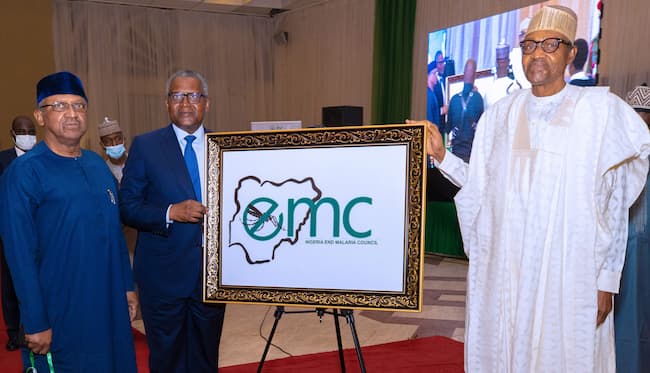President Muhammadu Buhari has on Tuesday launched the ‘Nigeria End Malaria Council’ at the State House in Abuja.
The Nigeria End Malaria Council (NEMC) is expected to drive the Federal Government’s (FG) commitment to end malaria in the nation.
Aliko Dangote, the President of the Dangote Group heads a 16-member council after he accepted to be an ambassador for malaria.
The President maintained the quest to eliminate mallards remains a priority for his administration.
“Malaria as we all know is an age-long disease and remains a major public health challenge in Nigeria. The World Health Organisation (WHO) report of 2021 shows that Nigeria alone accounts for 27% of all cases of malaria and 32% of deaths globally,” Buhari stated.
“Malaria infection can cause severe disease and complication in pregnant women and lead to high rates of miscarriage.
“It is also responsible for a considerable proportion of deaths in infants and young children, with children under 5 years being the most vulnerable group affected. These are reasons why we must not relent in fighting malaria.”
The strategy adopted has public health and socio-economic benefits for the country.
The council has been called upon to deploy best practices in its dealings in order to reduce significantly Nigeria’s malaria burden which according to the WHO now accounts for 27percent of all cases and 32 percent of deaths globally.
He added, “Our inauguration today will therefore ensure that malaria elimination remains a priority on our agenda, with strong political commitment from leaders at all levels. Additionally, the End Malaria Council will provide a platform to advocate for more funding to protect and sustain progress made so far by our country, and put us on a pathway to ending malaria for good.
“The successful implementation of the Council’s agenda will result in improvement in the quality of life, health and well-being of Nigerians, by providing impetus for malaria elimination and by saving about N687 billion nationally which is the estimated economic burden of malaria for 2022. The savings could increase to N2 trillion in 2030. A concerted strategy to tackle malaria, therefore, has both public health as well as socio-economic benefits for Nigeria.”
















